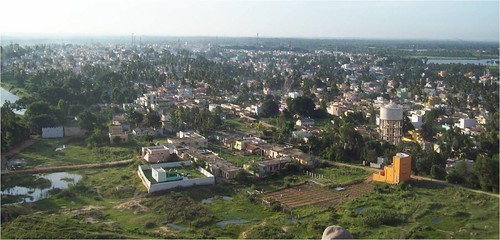/regions/kolar-district
Kolar District
Desilting tanks and uplifting collective spirits
Posted on 11 Apr, 2023 06:46 PMThe picturesque village of Marasanapalli in Bagepalli Block, Karnataka is home to 70 households who primarily practise agriculture, livestock rearing, and daily wage labour. Farmers here grow a variety of vegetables such as beans, ridge gourd, cauliflower, spring onion and beetroot, and some with land in the command area of the village tank grow paddy.

Committee for action against water contamination
Posted on 15 Jan, 2019 10:20 AMDevise time-bound plan to address water contamination: Parliamentary committee

Water for future
Posted on 22 Dec, 2017 03:12 PMWater, the most precious commodity is being abused to such an extent that there is fear that this might lead to another world war or it may be difficult even to get drinking water. Water is indeed an integral part of human body as it accounts for 66 percent of it.

A costly 200 km journey from source to tap
Posted on 23 Mar, 2014 10:40 PMIn July 2012, the Government of Karnataka approved the Yettinahole Diversion Project (YDP), which will cost an estimated Rs. 12,912.36 crore. This project is set to divert the head waters of the Gundia River (a tributary of the Kumardhara, which is a tributary of the Netravathi) in the west and transfer it to eastern parts of the state.

Influence of anthropogenic contamination on fluoride concentration in groundwater: A study of Mulbagal town, Kolar district, Karnataka
Posted on 15 Feb, 2013 04:53 PMGroundwater contamination is a serious, but relatively ignored issue in the country. This contamination occurs in either through geogenic or anthropogenic means. Fluoride contamination is one such example of geogenic contamination that is widely found in the Kolar district of Karnataka. However, the fluoride levels in the town of Mulbagal are lower than those in the surroundings. Earlier, a study was conducted on the impact of pit toilets on the groundwater in the area. The present paper investigates the presence of any link between these two phenomena.
Impact of pit-toilet leachate on groundwater chemistry and role of vadose zone in removal of nitrate and E. coli pollutants in Kolar District, Karnataka, India
Posted on 04 Jan, 2013 02:00 PMGiven the many problems associated with flush toilets and the sewerage system, pit toilets offer a viable solution in India. However, the use of soakpits raises the question of groundwater contamination. This paper assesses the impact of pit toilet leachate on groundwater quality in Mulbagal town (pop ~ 60,000) in Karnataka relies on pit toilets, and uses groundwater for drinking.
Training workshop on water, hygiene & sanitation and biosand water filters by SAPWII and CAWST, September 5-16, 2011, Kolar, Karnataka
Posted on 22 Aug, 2011 01:17 PM
Organizer: Centre for Affordable Water and Sanitation Technology (CAWST) in collaboration with South Asia Pure Water Initiative, Inc. (SAPWII)
A kalyani brought to life in Mulbagal, Karnataka: An Arghyam initiative
Posted on 27 Jul, 2011 05:58 PMGuest post by Manjunath Prasad
Increasing groundwater dependency and declining urban water quality – A comparative analysis of four South Indian cities
Posted on 15 Aug, 2010 07:18 AMThis paper by the Institute of Social and Economic Change (ISEC) examines the extent of groundwater dependency and quality status in four South Indian cities viz., Hubli, Dharwad, Belgaum and Kolar cities. Widespread water shortage problems have resulted in increased dependency on groundwater with tapping the resources to unsustainable levels. In Karnataka, out of 208 urban local bodies that come under Karnataka Urban Water Supply and Drainage Board, 41 depend on groundwater.
Seeds of hope - Case studies from the Planning Commission and Lokayan
Posted on 12 Jul, 2010 03:33 AMThis set of case studies is part of a book prepared by Lokayan in collaboration with the Planning Commission titled “Seeds of Hope", covers themes of agricultur